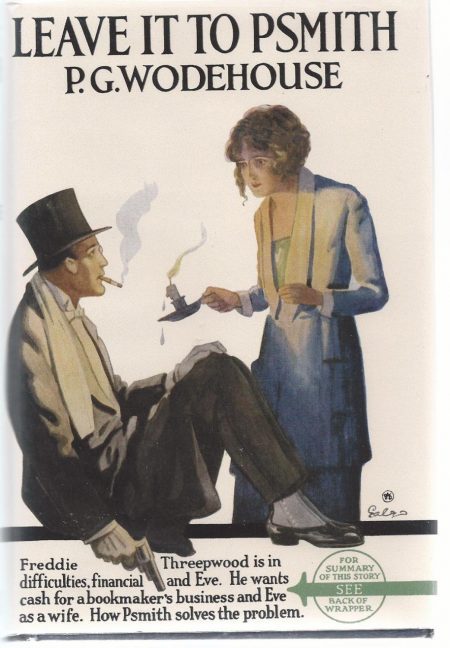LEAVE IT TO PSMITH (23)
By:
June 17, 2019

Leave It to Psmith (1923) is the last and most rewarding of four novels featuring the dandy, wit, and would-be adventurer Ronald Eustace Psmith, one of P.G. Wodehouse‘s most popular characters. (“One can date exactly,” Evelyn Waugh claimed, in reference to Psmith’s debut in the 1909 novel Mike, “the first moment when Wodehouse was touched by the sacred flame.”) Leave It to Psmith‘s copyright enters the public domain in 2019; HiLoBooks is pleased to serialize this terrific book here at HILOBROW. Enjoy!

The scrutiny of his lordship’s lobelias had palled upon Psmith at a fairly early stage in the proceedings, and he was sitting on the terrace wall enjoying a meditative cigarette when Freddie found him.
‘Ah, Comrade Threepwood,’ said Psmith, ‘welcome to Blandings Castle! You said something about wishing to have speech with me, if I remember rightly?’
The Honorable Freddie cast a nervous glance about him and seated himself on the wall.
‘I say,’ he said, ‘I wish you wouldn’t say things like that.’
‘Like what, Comrade Threepwood?’
‘What you said to the Peavey woman.’
‘I recollect having a refreshing chat with Miss Peavey yesterday afternoon,’ said Psmith, ‘but I cannot recall saying anything calculated to bring the blush of shame to the cheek of modesty. What observation of mine was it that meets with your censure?’
‘Why, that stuff about expecting to wear your hair shorter. If you’re going to go about saying that sort of thing — well, dash it, you might just as well give the whole bally show away at once and have done with it!’
Psmith nodded gravely.
‘Your generous heat, Comrade Threepwood, is not unjustified. It was undoubtedly an error of judgment. If I have a fault — which I am not prepared to admit — it is a perhaps ungentlemanly desire to pull that curious female’s leg. A stronger man than myself might well find it hard to battle against the temptation. However, now that you have called it to my notice, it shall not occur again. In future I will moderate the persiflage. Cheer up, therefore, Comrade Threepwood, and let us see that merry smile of yours, of which I hear such good reports.’
The appeal failed to alleviate Freddie’s gloom. He smote morosely at a fly which had settled on his furrowed brow.
‘I’m getting as jumpy as a cat,’ he said.
‘Fight against this unmanly weakness,’ urged Psmith. ‘As far as I can see, everything is going along nicely.’
‘I’m not so sure. I believe that blighter Baxter suspects something.’
‘What do you think he suspects?’
‘Why, that there’s something fishy about you.’
Psmith winced.
‘I would be infinitely obliged to you, Comrade Threepwood, if you would not use that particular adjective. It awakens old memories, all very painful. But let us go more deeply into this matter, for you interest me strangely. Why do you think that cheery old Baxter, a delightful personality if ever I met one, suspects me?’
‘It’s the way he looks at you.’
‘I know what you mean, but I attribute no importance to it. As far as I have been able to ascertain during my brief visit, he looks at everybody and everything in precisely the same way. Only last night at dinner I observed him glaring with keen mistrust at about as blameless and innocent a plate of clear soup as was ever dished up. He then proceeded to get outside it with envious enjoyment. So possibly you are all wrong about his motive for looking at me like that. It may be admiration.’
‘Well, I don’t like it.’
‘Nor, from an aesthetic point of view, do I. But we must bear these things manfully. We must remind ourselves that it is Baxter’s misfortune rather than his fault that he looks like a dyspeptic lizard.’
Freddie was not to be consoled. His gloom deepened.
‘And it isn’t only Baxter.’
‘What else is on your mind?’
‘The whole atmosphere of the place is getting rummy, if you know what I mean.’ He bent towards Psmith and whispered pallidly, ‘I say, I believe that new housemaid is a detective!’
Psmith eyed him patiently.
‘Which new housemaid, Comrade Threepwood? Brooding, as I do, pretty tensely all the time on deep and wonderful subjects, I have little leisure to keep tab on the domestic staff. Is there a new housemaid?’
‘Yes. Susan her name is.’
‘Susan? Susan? That sounds all right. Just the name a real housemaid would have.’
‘Did you ever,’ demanded Freddie earnestly, ‘see a real housemaid sweep under a bureau?’
‘Does she?’
‘Caught her at it in my room this morning.’
‘But isn’t it a trifle far-fetched to imagine that she is a detective? Why should she be a detective?’
‘Well, I’ve seen such a dashed lot of films where the housemaid or the parlor maid or what not were detectives. Makes a fellow uneasy.’
‘Fortunately,’ said Psmith, ‘there is no necessity to remain in a state of doubt. I can give you an unfailing method by means of which you may discover if she is what she would have us believe her.’
‘What’s that?’
‘Kiss her.’
‘Kiss her!’
‘Precisely! Go to her and say, ‘Susan, you’re a very pretty girl —’’
‘But she isn’t.’
‘We will assume, for purposes of argument, that she is. Go to her and say, ‘Susan, you are a very pretty girl. What would you do if I were to kiss you?’ If she is a detective she will reply, ‘How dare you, sir?’ — or possibly more simply, ‘Sir!’ Whereas if she is the genuine housemaid I believe her to be, and only sweeps under bureaus out of pure zeal, she will giggle and remark, ‘Oh, don’t be silly, sir!’ You appreciate the distinction?’
‘How do you know?’
‘My grandmother told me, Comrade Threepwood. My advice to you, if the state of doubt you are in is affecting your enjoyment of life, is to put the matter to the test at the earliest convenient opportunity.’
‘I’ll think it over,’ said Freddie dubiously.
Silence fell upon him for a space, and Psmith was well content to have it so. He had no specific need of Freddie’s prattle to help him enjoy the pleasant sunshine and the scent of Angus McAllister’s innumerable flowers. Presently, however, his companion was off again. But now there was a different note in his voice. Alarm seemed to have given place to something which appeared to be embarrassment. He coughed several times, and his neatly shod feet, writhing in self-conscious circles, scraped against the wall.
‘I say!’
‘You have our ear once more, Comrade Threepwood,’ said Psmith politely.
‘I say, what I really came out here to talk about was something else. I say, are you really a pal of Miss Halliday’s?’
‘Assuredly! Why?’
‘I say!’ A rosy blush mantled the Honorable Freddie’s young cheek. ‘I say, I wish you would put in a word for me, then.’
‘Put in a word for you?’
Freddie gulped.
‘I love her, dash it!’
‘A noble emotion,’ said Psmith courteously. ‘When did you feel this coming on?’
‘I’ve been in love with her for months. But she won’t look at me.’
‘That, of course,’ agreed Psmith, ‘must be a disadvantage. I am a child in these matters, but I should imagine that that would stick the gaff into the course of true love to no small extent.’
‘I mean, won’t take me seriously and all that. Laughs at me, don’t you know, when I propose. What would you do?’
‘I should stop proposing,’ said Psmith, having given the matter thought.
‘But I can’t.’
‘Tut, tut!’ said Psmith severely. ‘And, in case the expression is new to you, what I mean is pooh-pooh! You mustn’t let what is, after all, a mere habit get a mastery over you. You must struggle, you must use your will power. Say to yourself, ‘From now on I will not start proposing until after lunch.’ That done, it will be an easy step to do no proposing during the afternoon. And by degrees you will find that you can give it up altogether. The first proposal of the day is the really hard one to drop. Once you have conquered the impulse for the after-breakfast proposal, the rest will be easy.’
‘I believe she thinks me a mere butterfly,’ said Freddie, who had not been listening to this most valuable homily.
Psmith slid down from the wall and stretched himself.
‘Why,’ he said, ‘are butterflies so often described as mere? I have heard them so called a hundred times, and I cannot understand the reason… . Well, it would, no doubt, be both interesting and improving to go into the problem, but at this point, Comrade Threepwood, I leave you. I would brood.’
‘Yes, but I say, will you?’
‘Will I what?’
‘Put in a word for me.’
‘If,’ said Psmith, ‘the subject crops up in the course of the chitchat, I shall be delighted to spread myself with no little vim on the theme of your fine qualities.’
He melted away into the shrubbery just in time to avoid Miss Peavey, who broke in on Freddie’s meditations a moment later and kept him company till lunch.
SERIALIZED BY HILOBOOKS: Jack London’s The Scarlet Plague | Rudyard Kipling’s With the Night Mail (and “As Easy as A.B.C.”) | Arthur Conan Doyle’s The Poison Belt | H. Rider Haggard’s When the World Shook | Edward Shanks’ The People of the Ruins | William Hope Hodgson’s The Night Land | J.D. Beresford’s Goslings | E.V. Odle’s The Clockwork Man | Cicely Hamilton’s Theodore Savage | Muriel Jaeger’s The Man With Six Senses | Jack London’s “The Red One” | Philip Francis Nowlan’s Armageddon 2419 A.D. | Homer Eon Flint’s The Devolutionist | W.E.B. DuBois’s “The Comet” | Edgar Rice Burroughs’s The Moon Men | Charlotte Perkins Gilman’s Herland | Sax Rohmer’s “The Zayat Kiss” | Eimar O’Duffy’s King Goshawk and the Birds | Frances Hodgson Burnett’s The Lost Prince | Morley Roberts’s The Fugitives | Helen MacInnes’s The Unconquerable | Geoffrey Household’s Watcher in the Shadows | William Haggard’s The High Wire | Hammond Innes’s Air Bridge | James Branch Cabell’s Jurgen | John Buchan’s “No Man’s Land” | John Russell’s “The Fourth Man” | E.M. Forster’s “The Machine Stops” | John Buchan’s Huntingtower | Arthur Conan Doyle’s When the World Screamed | Victor Bridges’ A Rogue By Compulsion | Jack London’s The Iron Heel | H. De Vere Stacpoole’s The Man Who Lost Himself | P.G. Wodehouse’s Leave It to Psmith | Richard Connell’s “The Most Dangerous Game” | Houdini and Lovecraft’s “Imprisoned with the Pharaohs” | Arthur Conan Doyle’s “The Sussex Vampire”.
RADIUM AGE SCIENCE FICTION: “Radium Age” is HILOBROW’s name for the 1904–33 era, which saw the discovery of radioactivity, the revelation that matter itself is constantly in movement — a fitting metaphor for the first decades of the 20th century, during which old scientific, religious, political, and social certainties were shattered. This era also saw the publication of genre-shattering writing by Edgar Rice Burroughs, Sax Rohmer, E.E. “Doc” Smith, Jack London, Arthur Conan Doyle, Aldous Huxley, Olaf Stapledon, Karel Čapek, H.P. Lovecraft, Charlotte Perkins Gilman, Yevgeny Zamyatin, Philip Gordon Wylie, and other pioneers of post-Verne/Wells, pre-Golden Age “science fiction.” More info here.
READ GORGEOUS PAPERBACKS: HiLoBooks has reissued the following 10 obscure but amazing Radium Age science fiction novels in beautiful print editions: Jack London’s The Scarlet Plague, Rudyard Kipling’s With the Night Mail (and “As Easy as A.B.C.”), Arthur Conan Doyle’s The Poison Belt, H. Rider Haggard’s When the World Shook, Edward Shanks’ The People of the Ruins, William Hope Hodgson’s The Night Land, J.D. Beresford’s Goslings, E.V. Odle’s The Clockwork Man, Cicely Hamilton’s Theodore Savage, and Muriel Jaeger’s The Man with Six Senses. For more information, visit the HiLoBooks homepage.
